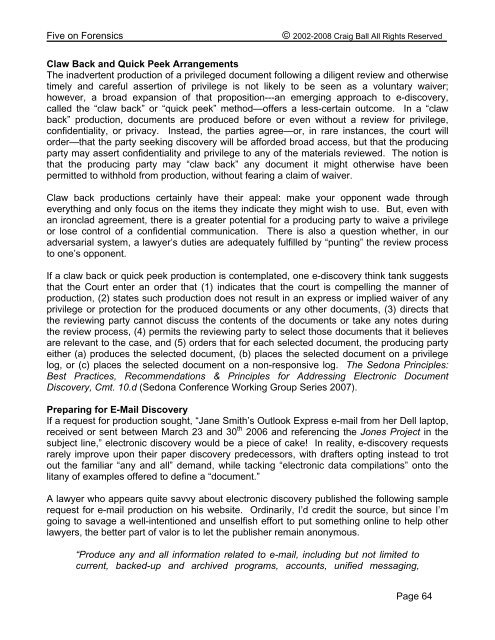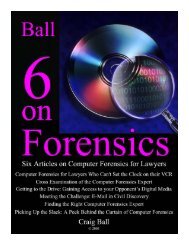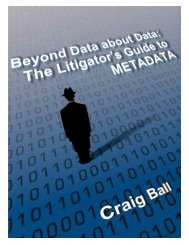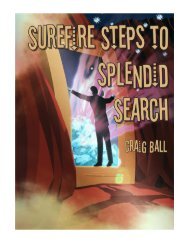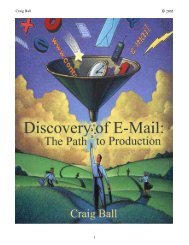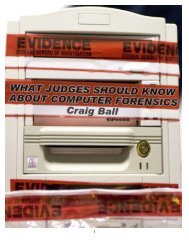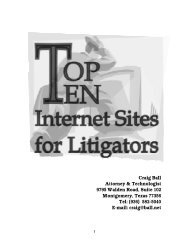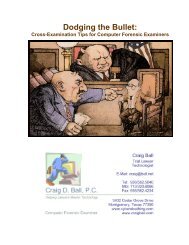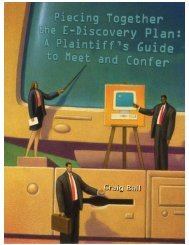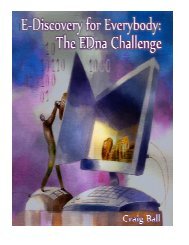Five on Forensics Page 1 - Craig Ball
Five on Forensics Page 1 - Craig Ball
Five on Forensics Page 1 - Craig Ball
Create successful ePaper yourself
Turn your PDF publications into a flip-book with our unique Google optimized e-Paper software.
<str<strong>on</strong>g>Five</str<strong>on</strong>g> <strong>on</strong> <strong>Forensics</strong><br />
© 2002-2008 <strong>Craig</strong> <strong>Ball</strong> All Rights Reserved<br />
Claw Back and Quick Peek Arrangements<br />
The inadvertent producti<strong>on</strong> of a privileged document following a diligent review and otherwise<br />
timely and careful asserti<strong>on</strong> of privilege is not likely to be seen as a voluntary waiver;<br />
however, a broad expansi<strong>on</strong> of that propositi<strong>on</strong>---an emerging approach to e-discovery,<br />
called the “claw back” or “quick peek” method—offers a less-certain outcome. In a “claw<br />
back” producti<strong>on</strong>, documents are produced before or even without a review for privilege,<br />
c<strong>on</strong>fidentiality, or privacy. Instead, the parties agree—or, in rare instances, the court will<br />
order—that the party seeking discovery will be afforded broad access, but that the producing<br />
party may assert c<strong>on</strong>fidentiality and privilege to any of the materials reviewed. The noti<strong>on</strong> is<br />
that the producing party may “claw back” any document it might otherwise have been<br />
permitted to withhold from producti<strong>on</strong>, without fearing a claim of waiver.<br />
Claw back producti<strong>on</strong>s certainly have their appeal: make your opp<strong>on</strong>ent wade through<br />
everything and <strong>on</strong>ly focus <strong>on</strong> the items they indicate they might wish to use. But, even with<br />
an ir<strong>on</strong>clad agreement, there is a greater potential for a producing party to waive a privilege<br />
or lose c<strong>on</strong>trol of a c<strong>on</strong>fidential communicati<strong>on</strong>. There is also a questi<strong>on</strong> whether, in our<br />
adversarial system, a lawyer’s duties are adequately fulfilled by “punting” the review process<br />
to <strong>on</strong>e’s opp<strong>on</strong>ent.<br />
If a claw back or quick peek producti<strong>on</strong> is c<strong>on</strong>templated, <strong>on</strong>e e-discovery think tank suggests<br />
that the Court enter an order that (1) indicates that the court is compelling the manner of<br />
producti<strong>on</strong>, (2) states such producti<strong>on</strong> does not result in an express or implied waiver of any<br />
privilege or protecti<strong>on</strong> for the produced documents or any other documents, (3) directs that<br />
the reviewing party cannot discuss the c<strong>on</strong>tents of the documents or take any notes during<br />
the review process, (4) permits the reviewing party to select those documents that it believes<br />
are relevant to the case, and (5) orders that for each selected document, the producing party<br />
either (a) produces the selected document, (b) places the selected document <strong>on</strong> a privilege<br />
log, or (c) places the selected document <strong>on</strong> a n<strong>on</strong>-resp<strong>on</strong>sive log. The Sed<strong>on</strong>a Principles:<br />
Best Practices, Recommendati<strong>on</strong>s & Principles for Addressing Electr<strong>on</strong>ic Document<br />
Discovery, Cmt. 10.d (Sed<strong>on</strong>a C<strong>on</strong>ference Working Group Series 2007).<br />
Preparing for E-Mail Discovery<br />
If a request for producti<strong>on</strong> sought, “Jane Smith’s Outlook Express e-mail from her Dell laptop,<br />
received or sent between March 23 and 30 th 2006 and referencing the J<strong>on</strong>es Project in the<br />
subject line,” electr<strong>on</strong>ic discovery would be a piece of cake! In reality, e-discovery requests<br />
rarely improve up<strong>on</strong> their paper discovery predecessors, with drafters opting instead to trot<br />
out the familiar “any and all” demand, while tacking “electr<strong>on</strong>ic data compilati<strong>on</strong>s” <strong>on</strong>to the<br />
litany of examples offered to define a “document.”<br />
A lawyer who appears quite savvy about electr<strong>on</strong>ic discovery published the following sample<br />
request for e-mail producti<strong>on</strong> <strong>on</strong> his website. Ordinarily, I’d credit the source, but since I’m<br />
going to savage a well-intenti<strong>on</strong>ed and unselfish effort to put something <strong>on</strong>line to help other<br />
lawyers, the better part of valor is to let the publisher remain an<strong>on</strong>ymous.<br />
“Produce any and all informati<strong>on</strong> related to e-mail, including but not limited to<br />
current, backed-up and archived programs, accounts, unified messaging,<br />
<strong>Page</strong> 64


